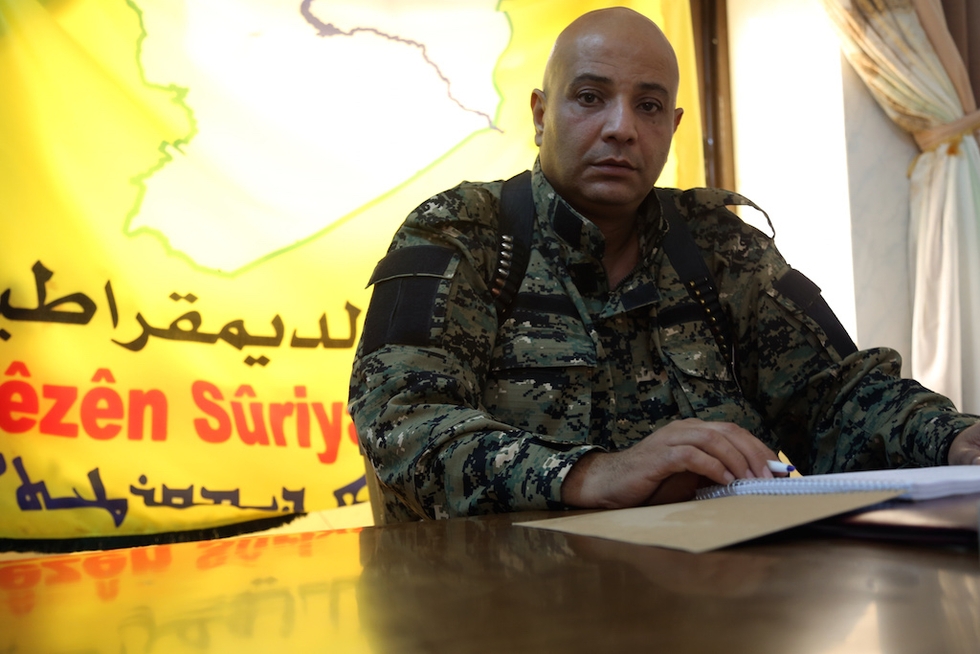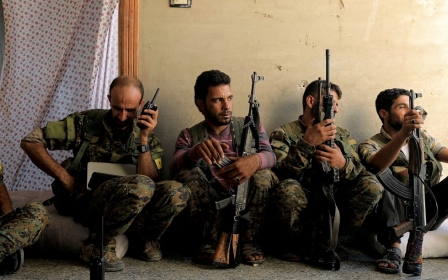SDF spokesman 'defects' to Turkish-backed rebels in Syria

The spokesman for the US-backed Syrian Democratic Forces has defected to Turkey and fled to Turkish-backed, rebel-controlled territory in Jarabalus, according to reports.
Colonel Talal Silo, a Turkmen and public face of the SDF coalition, on Tuesday evening fled to the Aoun al-Daddat checkpoint that connects areas controlled by the Turkish Euphrates Shield coalition with the SDF-controlled city of Manbij, according to the Northern Syria Observer.
Photos released on social media appeared to show Silo entering a Turkish military vehicle:
A spokesperson for the Turkey-based "Syrian Interim Government" told al-Araby al-Jadeed that Silo had joined their ranks because he was upset at the domination of the SDF by Kurdish forces and the marginalisation of Arabs and Turkmen.
Colonel Haitham al-Afisi, deputy chief of staff of the SIG, said more details would be released on the defection later in the day, but added that it had been coordinated with the Free Syrian Army.
Middle East Eye could not verify the statement. Neither the US-led coalition nor the SDF had responded to requests for comment at time of publication.
The new SDF spokesman is Redur Xelil, who held the same role for the People's Protection Units (YPG), which forms the largest component of the SDF.
Silo had previously led the YPG-affiliated Seljuk Brigades, which was comprised of Syrian Turkmen.
Last month, the SDF captured Raqqa, the last major stronghold of the Islamic State group in Syria, with the backing of US-led coalition air strikes.
The YPG have long championed a project of decentralised government as their end goal in Syria and the group established what it called the Democratic Federation of Northern Syria last year, as an attempt to formalise that.
Still, Turkey has been alarmed at the prospect of a group it views as affiliated with the Kurdistan Workers' Party (PKK) - with whom Turkey has fought a decades-long guerilla war - and has moved to prevent any pro-Kurdish statelet from forming on its border.
Turkey launched Operation Euphrates Shield in August 2016, supporting Syrian rebel fighters as they took back areas of northern Syria from IS.
However, the long-term plan has been to challenge the dominance of the SDF despite the US and Turkey being Nato members and allies.
On Wednesday, the Turkish foreign ministry said that the YPG was not interested in fighting IS but aimed to "create illegitimate faits-accomplis on the ground, to occupy territories and to alter their demographic structures."
The Turkish president, Recep Tayyip Erdogan, has vowed he would not allow a "terror corridor" controlled by the YPG in Syria close to Turkey's border.
He has also warned that Turkey could yet mount a military operation against the YPG to oust the group from the northern Syrian town of Afrin.
Middle East Eye propose une couverture et une analyse indépendantes et incomparables du Moyen-Orient, de l’Afrique du Nord et d’autres régions du monde. Pour en savoir plus sur la reprise de ce contenu et les frais qui s’appliquent, veuillez remplir ce formulaire [en anglais]. Pour en savoir plus sur MEE, cliquez ici [en anglais].




